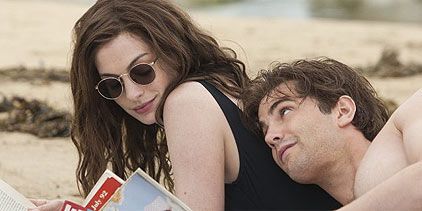Warning to hunky French jazz pianists: beware a slim, raven-haired Englishwoman who looks like Anne Hathaway but goes by the name of Emma and will up and leave you the second her long-standing chum, Dex, crosses la Manche to extend rather more than a main by way of welcome. Sound unfair? Sure, but love - indeed life, as it is honestly and genuinely lived - hasn't a prayer up against the breathtakingly vacuous conceit that drives One Day, a film that makes zero sense except where these things matter most: the box office.
I recognise that not all will share my scepticism, if the reaction of several around me at the press screening is any gauge on those occasions when people got up during the film to head for the loo (or perhaps home). "Sit down," or "Move aside!" these palpably perfervid devotees all but chorused, lest they miss a minute of the action that is tiresomely pre-ordained from the outset. Well, not to rain on their parade, but watching Lone Scherfig's adaptation of the David Nicholls bestseller of the same name, I was reminded of that lyric from the Stephen Sondheim musical, Follies: "How do you wipe tears away when your eyes are dry?"
Given that I have been known to cry at television commercials (how moving that detergent can get clothes so clean), I was surprised at my own response to One Day, not least given Scherfig's superlative work on An Education, a film rife with the detail and individuation of character that the suffocating conceit of the source novel on this occasion doesn't allow. Her newest film is more concerned with honoring a structure that was pretty cheesy when Bernard Slade made it the basis of his play Same Time Next Year over 30 years ago. And when you don't know how to end the damn thing? Well, anyone read or seen Love Story?
It says something about what's gone awry that the movie doesn't even seem to be about the right people, no matter how insistently it returns to university classmates Emma and Dex every St Swithin's Day since time began (oops, I mean 1988). For all that we follow Dex's success in the world of TV and Emma's travails as a writer with clockwork precision over time, easily the most engaging character is Rafe Spall as the male second banana, Ian. He's the comedian who burned a torch for Emma way back when and who seems to drain the film of any spontaneity the minute he departs the action. (Spall's brief return to proceedings near the end is greeted with the enthusiasm you might save for an impromptu visitor who has just rescued a particularly long Christmas dinner.)
 Elsewhere, one merely has to let take its course a narrative (see our happy twosome here on holiday) guided in no way by logic but merely by protracting the inevitable from its Edinburgh beginnings onwards, without which there would be no book or film. Dex marries and has a child - Romola Garai, on a bit of a roll of late across all art forms, is spikily unsentimental as Dex's adulterous, supposedly humourless wife - while Emma changes relationships, and hairstyles, on her way to the French coupling that Dex's arrival abruptly brings to an end. In keeping with the Gallic placement, Hathaway, at times, looks like Audrey Tautou.
Elsewhere, one merely has to let take its course a narrative (see our happy twosome here on holiday) guided in no way by logic but merely by protracting the inevitable from its Edinburgh beginnings onwards, without which there would be no book or film. Dex marries and has a child - Romola Garai, on a bit of a roll of late across all art forms, is spikily unsentimental as Dex's adulterous, supposedly humourless wife - while Emma changes relationships, and hairstyles, on her way to the French coupling that Dex's arrival abruptly brings to an end. In keeping with the Gallic placement, Hathaway, at times, looks like Audrey Tautou.
It says something about the absence of characterisation available to the actors that Rachel Portman's score - an insistent piano motif, in particular - is required to do an inordinate amount of heavy lifting when it would actually be nice to discover something about these two as people, not just as puppets of their creator. Emma, especially, seems to exist more or less entirely out of context, which may explain the passing Yorkshire tones of Hathaway's English accent, which is passable but no more. (On the other hand, given that Brits play every third American role these days on film and TV - take, for instance, Luke Treadaway in the forthcoming You Instead - it seems awfully churlish to deny the gifted Hathaway the chance at least to do this part.)
Jim Sturgess fares marginally better, not least in the later passages of the film - 2007, to be precise - when Dex gets edgy and violent and threatens to blast open the straitjacket into which the material has from its very conception been placed. Dex, too, at least gets some of the familial interaction that is denied Emma, which in turn allows brief appearances from Patricia Clarkson and Ken Stott, the former suffering the fate that seems to be this terrific actress's celluloid lot. Stott, looking and sounding more cantankerous than ever, at one point urges Dex to watch Silent Witness in an exhortation that gives this film the lie. "But I can't," Dex seems to be protesting. "I'm in the middle of One Day." At which point, I don't think I'm the only one who mentally clocked Stott switching channels. Or switching off.
Watch the trailer for One Day















Add comment